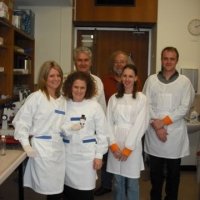
Tuesday, 29 June 2010
Tea tree oil may be used in future as a fast, cheap, safe and effective treatment for non-melanoma skin cancers and precancerous lesions, according to researchers at The University of Western Australia.
A three-year study by UWA's Tea Tree Oil Research Group has found solid tumours grown under the skin in mice and treated with a tea tree oil formulation causes inhibition of tumour growth and tumour regression within a day of treatment. Within three days, the tumours cannot be detected.
The study by research associates Dr Sara Greay and Dr Demelza Ireland of UWA's School of Biomedical, Biomolecular and Chemical Sciences and colleagues was published online in the journal Cancer Chemotherapy Pharmacology.
It was carried out in collaboration with Rural Industries Research and Development Corporation (RIRDC) and Novasel Pty. Ltd. Dr Greay said further experiments indicated the anti-cancer effect of the tea tree oil formulation appeared to involve activation of the immune system.
"We are very excited about these results and are hoping to find funding for a small clinical trial of about 50 people with pre-cancerous lesions, with the aim of preventing the development of skin cancers," Dr Greay said.
Unlike other clinically approved skin cancer chemotherapies, which have long treatment times of three to 16 weeks and can cause nausea and flu-like symptoms, the tea tree oil formulation only produces mild skin irritation which disappears within days of treatment finishing.
"We believe the formulation is crucial to prevent the evaporation and increase the penetration of tea tree oil through the skin," Dr Greay said.
"Clinical trials in human patients with precancerous lesions or skin cancers must be conducted to test the efficacy and safety of our tea tree formulations before any treatment will be available to the public.
"We do not recommend that tea tree oil products available over the counter be applied to precancerous lesions or skin cancers. If you suspect you have a skin cancer or sun spots, please see your GP or Dermatologist," Dr Greay said.
Australia has the highest incidence of skin cancer worldwide with around 434,000 Australians treated for one or more non-melanoma skin cancers every year. In addition, in 2001, Cancer Council Australia estimated the treatment of non-melanoma skin cancer cost $264 million.
Tea tree oil is a natural, renewable resource from Melaleuca alternifolia , a tree native to New South Wales. Increased demand for the oil would strengthen the industry and, besides the medical benefits, would also benefit the rural communities based on the production of the oil.
Dr Greay, Dr Ireland and their colleagues Haydn Kissick, Dr Christine Carson, Winthrop Professor Tom Riley and Associate Professor Manfred Beilharz were funded by the RIRDC and Novasel Pty Ltd.
For non-media enquiries please send an email to Dr Sara Greay
Media references
Dr Sara Greay
(Biomedical, Biomolecular and Chemical Sciences) (+61 8) 9346 2242
Janine MacDonald
(UWA Public Affairs) (+61 8) 6488 5563 / (+61 4) 32 637 716
Tags
- Channels
- Events — International — Media Statements — Research — University News
- Groups
- UWA Institute of Agriculture